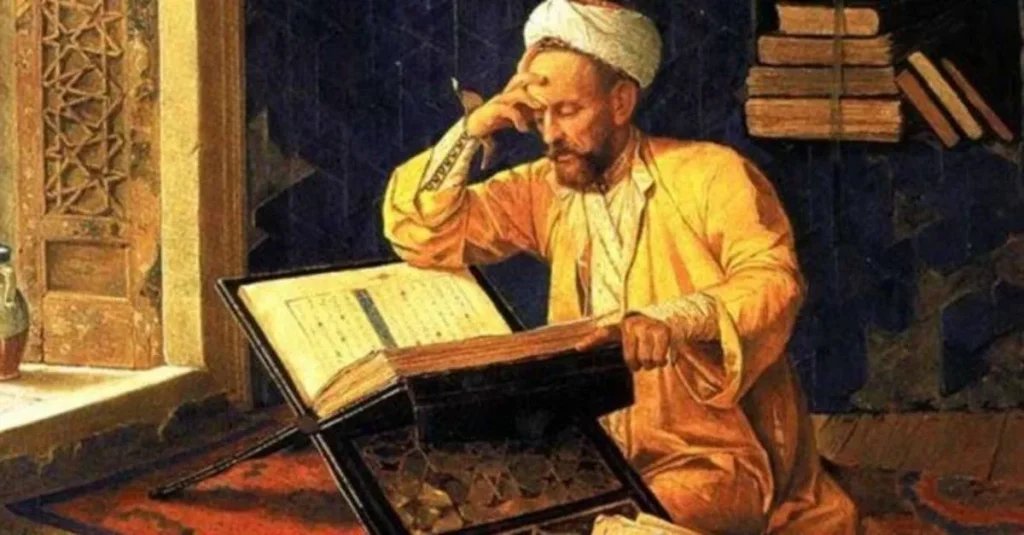
A of portrait of Imam Al-Ghazali
Imam Al-Ghazali’s Contributions to Islamic Thought and Sufism
Imam Al-Ghazali (رحمه الله) continues to influence contemporary Islamic philosophy and thought [1]. His ideas remain relevant today.
He inspired modern scholars to integrate reason, ethics, and spirituality in philosophical discourse [2]. His methodology guides balanced inquiry.
Al-Ghazali’s critique of extreme rationalism informs contemporary debates on faith and reason. Scholars follow his approach in Islamic universities [1].
His works encourage moral and spiritual grounding in intellectual pursuits. Knowledge without ethics is considered insufficient [3].
Philosophers and theologians draw from his ideas in addressing modern challenges. Al-Ghazali’s principles remain foundational in ethics and jurisprudence [2].
His Sufi insights also influence contemporary spiritual movements. Inner purification and reflective practice are widely applied [1].
Al-Ghazali’s integration of knowledge, spirituality, and morality inspires modern Islamic education. Curricula often incorporate his ethical and philosophical teachings [3].
In essence, Al-Ghazali’s influence persists. Contemporary Islamic philosophy reflects his enduring balance of intellect, ethics, and faith [2].
References:
- Al-Ghazali, Ihya’ Ulum al-Din, 11th century.
- Fakhry, Majid, A History of Islamic Philosophy, Columbia University Press, 2004.
- Hourani, George, Islamic Thought in the Classical Age, Cambridge University Press, 1983.
His Influence on Contemporary Islamic Philosophy
Imam Al-Ghazali (رحمه الله) bridged Islamic jurisprudence, theology, and Sufism, creating a comprehensive approach to faith [1].
He emphasized moral and spiritual development alongside intellectual growth. Ethics were central to his teachings [2].
Al-Ghazali integrated Sufi practices into mainstream Islamic thought. Inner purification, meditation, and reflection were encouraged [1].
His works, especially Ihya’ Ulum al-Din, offered guidance on ethics, devotion, and spiritual discipline for all Muslims [3].
He reconciled philosophy and revelation, guiding scholars to balance reason with divine law [2]. This approach influenced Islamic education.
Al-Ghazali stressed sincerity in worship. Knowledge without proper intention and morality was considered incomplete [1].
His Sufi insights shaped subsequent mystical thought. Many Sufi orders followed his teachings on spiritual growth and moral discipline [3].
In essence, Al-Ghazali’s contributions enriched Islamic thought. He united law, philosophy, and Sufism, leaving a lasting spiritual legacy [2].
References:
- Al-Ghazali, Ihya’ Ulum al-Din, 11th century.
- Fakhry, Majid, A History of Islamic Philosophy, Columbia University Press, 2004.
- Hourani, George, Islamic Thought in the Classical Age, Cambridge University Press, 1983.
Conclusion
Imam Al-Ghazali (رحمه الله) remains one of Islam’s most influential scholars. His works shaped thought, spirituality, and ethics [1].
He integrated philosophy, theology, and Sufism. Al-Ghazali showed that reason and faith can coexist harmoniously [2].
His writings guide scholars, students, and spiritual seekers. Ethics, inner purification, and reflection are central in his teachings [1].
Al-Ghazali emphasized moral grounding in knowledge. Intellectual achievement without ethical practice is incomplete [3].
He influenced generations of philosophers, theologians, jurists, and Sufi practitioners. His ideas remain foundational in Islamic scholarship [2].
His legacy endures in education, philosophy, and spiritual guidance. Ihya’ Ulum al-Din continues to inspire Muslims worldwide [1].
In essence, Al-Ghazali’s life exemplifies dedication to knowledge, piety, and ethical living. His teachings remain timeless and universally relevant [3].
References:
- Al-Ghazali, Ihya’ Ulum al-Din, 11th century.
- Fakhry, Majid, A History of Islamic Philosophy, Columbia University Press, 2004.
- Hourani, George, Islamic Thought in the Classical Age, Cambridge University Press, 1983.
Imam Al-Ghazali’s Teachings in the Modern World
Imam Al-Ghazali (رحمه الله) continues to offer guidance in the modern world [1]. His teachings remain relevant today.
His emphasis on ethics and morality guides individuals in personal, professional, and social life [2]. Integrity is central to his lessons.
Al-Ghazali’s integration of reason, faith, and spirituality informs contemporary Islamic education. Students learn holistic intellectual and moral development [1].
His focus on inner reflection and self-purification aids mental and spiritual well-being in today’s fast-paced society [3].
Modern scholars and spiritual leaders reference his works to address challenges like materialism, moral confusion, and ethical dilemmas [2].
Sufi practices promoted by Al-Ghazali continue to nurture mindfulness, discipline, and ethical living across communities worldwide [1].
In essence, Al-Ghazali’s teachings offer timeless guidance. They harmonize knowledge, ethics, and spirituality for modern Muslim life [3].
References:
- Al-Ghazali, Ihya’ Ulum al-Din, 11th century.
- Fakhry, Majid, A History of Islamic Philosophy, Columbia University Press, 2004.
- Hourani, George, Islamic Thought in the Classical Age, Cambridge University Press, 1983.
His Place in the Islamic Tradition
Imam Al-Ghazali (رحمه الله) holds a central place in Islamic tradition. His influence spans scholarship, spirituality, and ethics [1].
He bridged the gap between theology, philosophy, and Sufism. His approach balanced reason, revelation, and moral practice [2].
Al-Ghazali’s works, especially Ihya’ Ulum al-Din, shaped Islamic education. They remain core texts in seminaries and universities [1].
His moral and spiritual teachings continue to guide individuals. Ethics, sincerity, and self-reflection are central principles [3].
Philosophers and scholars across centuries reference his ideas. His critiques of rationalism and emphasis on spirituality influenced Islamic thought profoundly [2].
Sufi orders also adopted his insights. Inner purification, mindfulness, and ethical discipline became widespread practices [1].
In essence, Al-Ghazali exemplifies the integration of knowledge, piety, and ethical living. His place in Islamic tradition is unmatched [3].
References:
- Al-Ghazali, Ihya’ Ulum al-Din, 11th century.
- Fakhry, Majid, A History of Islamic Philosophy, Columbia University Press, 2004.
- Hourani, George, Islamic Thought in the Classical Age, Cambridge University Press, 1983.






